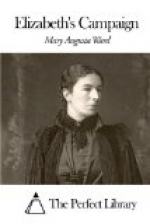Of course some stupid creatures might think he was falling in love with her—wanting to marry her. He laughed the charge to scorn. No! but he confessed her comradeship, her friendship, had begun to mean a good deal to him. For twenty years he had lived in loneliness. Now, it seemed, he had found a friend, in these days when the new independence of women opens a thousand fresh possibilities not only to them, but to men also.
Well, well, it was all over! Better make up his mind to it.
He went to the window, as it was nearing ten o’clock, and looked out. It was foggy still, the moon and stars scarcely visible. He hoped they would have at least the sense at the Rectory to provide her with a lantern, for under the trees the road was very dark.
Oh, far in the distance, a twinkling light! Good! The Squire hastily shut the window, and resumed his pacing. Presently he thought he heard the house door open and shut, and a little while after the library clock struck ten.
Now it would be only the natural thing to go and say good-night to his daughters, and, possibly, to inquire after a headache.
The Squire accordingly emerged. In the hall he found his three daughters engaged in lighting their candles at the Chippendale table, where for about a hundred and fifty years the ladies of Mannering had been accustomed to perform that rite.
The master of the house inquired coldly whether Miss Bremerton had returned safely. ‘Oh yes,’ said his daughter Margaret, ’but she went up to bed at once. She hasn’t got rid of her headache.’
Mrs. Strang’s stiff manner, and the silence of the others showed the Squire that he was deep in his daughters’ black books. Was he also charged with Miss Bremerton’s headache? Did any of them guess what had happened? He fancied from the puzzled look in Pamela’s eyes as she said good-night to him that she guessed something.
Well, he wasn’t going to tell them anything. He went back to the library, and presently Pamela, in her room upstairs, heard first the library bell, then the steps of Forest crossing the hall, and finally a conversation between the Squire and the butler which seemed to last some time.
* * * * *
It was in the very early morning—between four and five—that Elizabeth was wakened, first by vague movements in the house, and then by what seemed to be cautious voices outside. She drew a curtain back and looked out—a misty morning, between darkness and dawn, and trees standing on the grass in dim robes of amethyst and gold. Two men in the middle distance were going away from the house. She craned her neck. Yes—no doubt of it! The Squire and Forest. What could they be about at that hour of the morning? They were going, no doubt, to inspect the barricades! Yet Forest himself had told her that nothing would induce him to take a hand in the ‘row.’
It was strange; but she was too weary and depressed to give it much thought. What was she going to do now? The world seemed emptily open before her once more, chill and lonely as the autumn morning.




